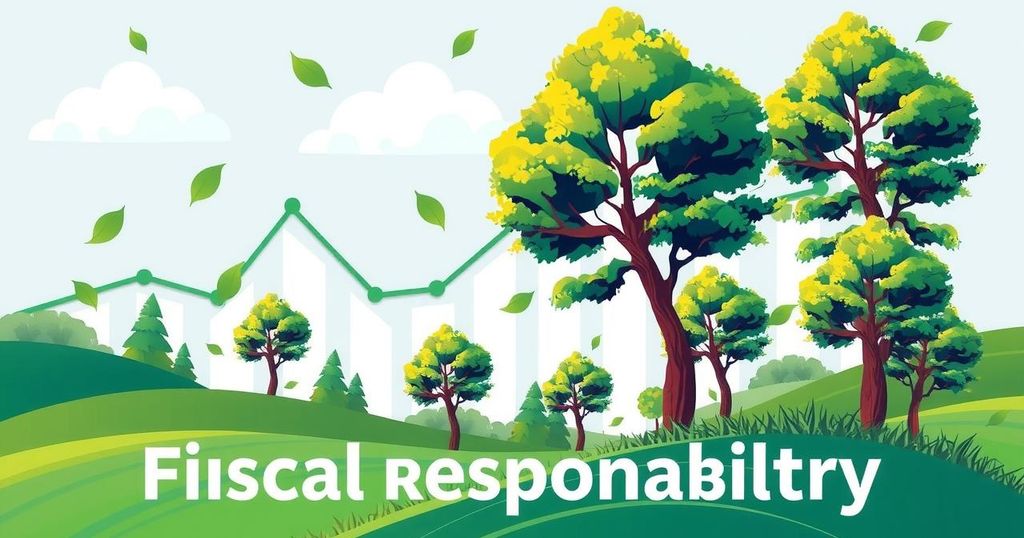Business
economics
ABUBA, ABUBAKAR BAGUDU, AFRICA, ANTI-CORRUPTION, BAGUD, BUDGET AND ECONOMIC PLANNING, DEVELOPMENT, ECONOMIC GROWTH, ECONOMY, FINANCIAL INCLUSION, IBRAHIM BABANGIDA, KEBBI, MINISTRY OF BUDGET AND ECONOMIC PLANNING, NIGERIA, PLANNING, POVERTY REDUCTION AND GROWTH STRATEGY, TINUBU
Fatima Khan
0 Comments
Bagudu’s Fiscal Reforms: A Transformative Era for Nigeria’s Economy
President Bola Ahmed Tinubu’s approval of the 2025 budget marks a pivotal shift in Nigeria’s fiscal strategy, emphasizing efficiency and accountability. Minister Abubakar Bagudu’s adept management has streamlined budget processes, facilitating significant allocations to infrastructure and job creation. Innovations in monitoring and transparency are noteworthy as Nigeria works towards economic recovery and poverty reduction under the new administration.
President Bola Ahmed Tinubu’s approval of the 2025 budget signifies a critical advancement in Nigeria’s fiscal approach, highlighting the government’s commitment to timely budgetary processes. Although there was a two-month delay compared to the 2024 budget, improvements in the budget proposal review and legislative approval efficiencies are noteworthy. Minister Abubakar Bagudu, appointed in August 2023, exhibited exceptional fiscal management and guided the 2024 budget efficiently, securing its presidential assent by January 2024.
Abubakar Bagudu’s extensive background in economic planning, having served under various administrations, has enabled him to streamline the budgetary process effectively. The 2025 budget, termed the “Budget of Restoration,” is now operational and aims to direct fiscal policies across ministries, departments, and agencies (MDAs). It is essential to evaluate the Ministry of Budget and Economic Planning’s execution in terms of economic recovery, job creation, and poverty reduction as the administration approaches its second year.
The allocations of the 2025 budget focus on national priority areas such as economic growth, poverty reduction, and enhancing access to capital. In 2023, Bagudu reported substantial job creation outcomes through the National Poverty Reduction and Growth Strategy (NPRGS), leading to the establishment of over 67,000 jobs across Nigeria. The integration of geospatial analytics is expected to further optimize resources and enhance policy formulation, aiming to improve access to social services and alleviate deprivation.
The Ministry has effectively coordinated the implementation of the NG-CARES program, assisting seven million vulnerable households impacted by the COVID-19 pandemic across 35 states and the FCT. Despite prevalent public skepticism regarding fiscal management, Bagudu’s administration has prioritized transparency, ensuring timely economic data reporting through the National Bureau of Statistics (NBS).
Moreover, the strategic allocation of the budget showcases a commitment to critical sectors, with N4.06 trillion earmarked for infrastructure—a record high in recent years. Projects such as the Abuja-Kaduna and Lagos-Ibadan rail lines will benefit from these funds, alongside significant allocations to defense, education, and health—particularly highlighting a noteworthy increase in health sector funding.
Innovation in budget monitoring, including the development of the ‘Eyemark’ application, exemplifies the administration’s dedication to accountability. This initiative allows citizens to provide feedback on federal projects and ensures that 500 selected government initiatives funded through the 2023 budget are scrutinized.
In conclusion, Abubakar Bagudu’s leadership heralds a transformative period of fiscal responsibility and strategic planning within Nigeria’s economic landscape. His prowess in timely budget delivery and the effective monitoring of public projects are poised to create lasting impacts on the nation’s economic growth, job creation, and overall fiscal stability.
In summary, President Tinubu’s support for the 2025 budget, spearheaded by Minister Bagudu, reflects a pivotal shift towards enhanced fiscal responsibility and growth in Nigeria. The focus on strategic allocations to vital sectors, robust job creation efforts, and improved budget monitoring mechanisms are crucial for the country’s economic trajectory. As the administration progresses, Bagudu’s emphasis on transparency and accountability will be integral in restoring fiscal stability and achieving sustainable development objectives.
Original Source: businessday.ng




Post Comment